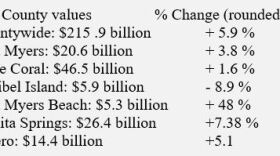The Collier County Board of Commissioners voted unanimously recently to move forward with efforts to identify solutions to noise pollution throughout the county.
A local community group, Quiet Florida, advocated for action against noise pollution issues at a recent commission meeting. Mary Tatigian, the president of Quiet Florida, said she believes excessive noise from illegally modified vehicles is lowering the community’s quality of life.
“The noise permeates our homes and robs us of peace and quiet,” Tatigian said at the meeting. “We are left unable to enjoy the outside. It’s almost impossible for us to enjoy it.”
Paul Schwinghammer, a Naples resident for the past 18 months, said he notices the noise.
“People punch on their accelerator and, man, you can hear it,” Schwinghammer said. “You’re sitting out on your lanai and you’re embarrassed, frankly, when we have friends and family over visiting to have to explain. ‘Wow, what’s that noise?’ they will ask.”
Along with the disruption that comes from the noise, Tatigian also worries about the health issues that noise pollution can cause. According to the Environmental Protection Agency, studies have indicated a relationship between noise pollution and certain health issues, including stress-related illnesses, high blood pressure, speech interference, hearing loss, sleep disruption, and lost productivity.
“I have elderly citizens contact me telling me they're trapped in their homes,” Tatigian said. “I've actually had retired military contact me and they’re suffering with PTSD and the chronic noise is upsetting them.”
Florida law puts certain limits on the decibel levels of different motor vehicles at varying speeds. For instance, motorcycles have to be under 78 decibels if they are going 35 mph or less. If they are going over 35 mph, they have to be under 82 decibels. Relying on decibel levels makes it more difficult to enforce the guidelines set by the noise ordinance, according to Lieutenant David Bruening of the Collier County Sheriff’s Office.
“We have to be able to testify that we knew the vehicle was modified,” Lt. Bruening said. “That limits us to the cars that are grossly modified.”
While modified cars can contribute to noise pollution issues, even cars that have not been modified can create excessive noise. Lt. Bruening pointed out that a lot of cars have a sports mode that changes the exhaust system for use on race tracks, not public roadways. This allows cars that are not obviously modified to become less likely to face any consequences for creating excessive noise.

The commissioners may consider the use of noise cameras as one possible solution. Noise cameras are programmed with an algorithm that only activates the camera when exposed to a noise that is above a certain decibel level. They are being used around the country to combat noise pollution. Knoxville, Tennessee, became the second municipality in the United States to utilize noise cameras in February, 2022.
“It's a trickier thing than just necessarily getting like an officer out there with a decibel reader and writing a bunch of tickets,” Carter Hall, the City of Knoxville’s Policy and Business Innovation manager, said. “And we were trying to think of more creative ways that we could try to crack down on the issue.”
That’s when he came across noise cameras, which were being used in London and New York. The city got a demo camera and began using it in different places around Knoxville.
One downfall of noise cameras is that many courts will not accept the findings as evidence. So their primary role of the cameras is to collect data to identify areas that have the most vehicle-related noise pollution, according to Carter Hall from Knoxville..
“We can still use the camera to gain a bunch of data, get insights on some questions that we had around noise violations, mainly things like, ‘Are there specific times of day when people are violating more often than others? Are these the same kind of vehicles that are doing it?’” Hall said. “So like, well, we saw these questions that could help us with some on the ground enforcement with police officers.”
Lt. Bruening said the noise issue extends beyond Collier County.
“This is a state-level, if not even federal [responsibility], to make a significant impact on what we have going on,” Lt. Bruening said.
For now the Collier board has decided to look further into the issue and find some potential solutions to cut down the noise.
“Education is the key to success,” Collier Commissioner William McDaniel said. “If we can transition away from the modification of mufflers and better educate the population, I know there were enhancements to the statute with regard to the penalties that come along with the modification, that’s certainly an incentive that will help people comply with the noise statutes.”
This story was produced by the Democracy Watch class n the FGCU Journalism Program. Alexandra McBride can be reached at akmcbride9773@eagle.fgcu.edu







